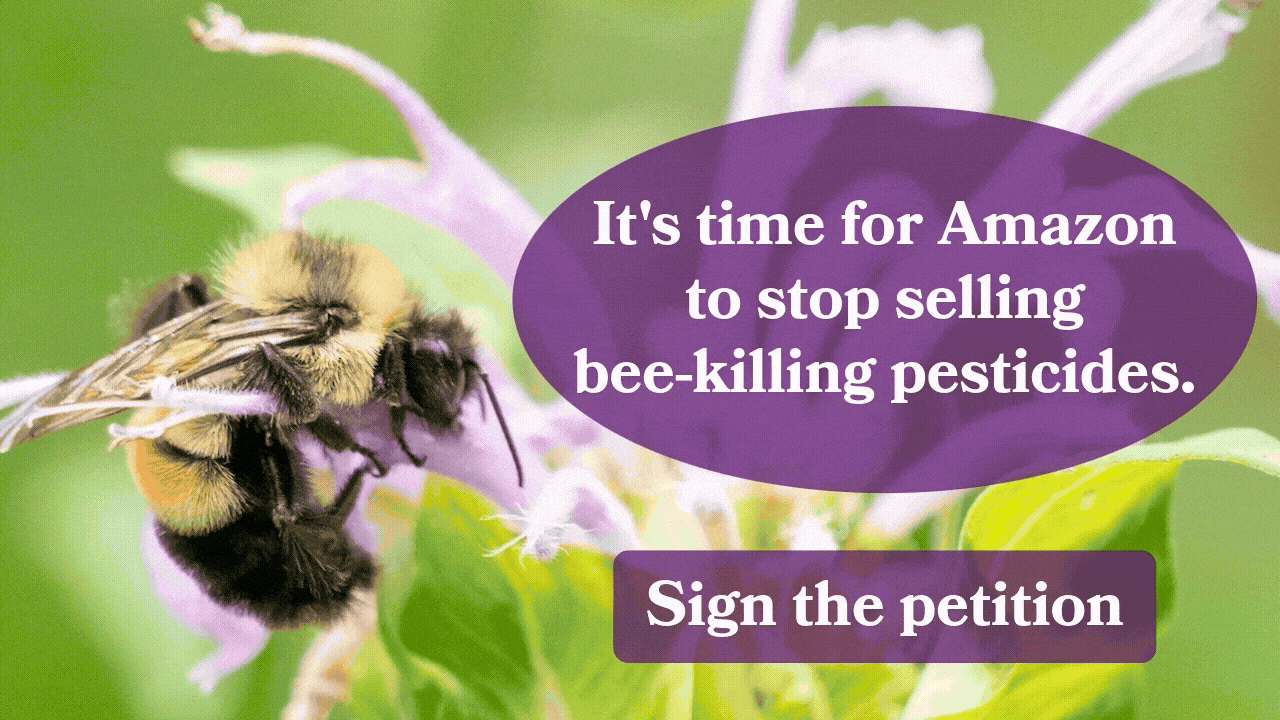
John,
A bumblebee's day is spent bobbing between blooms, collecting nectar and pollen to bring back to her colony's nest. It's a busy existence, but one she's perfectly adapted to.
When she first lands upon a garden flower treated with neonicotinoid pesticides, she doesn't understand that in one motion, her life and that of her entire colony has been doomed.
The gardener who used pesticides is also likely unaware that her yard is now a minefield for the local bees. Perhaps she simply wanted to help her garden flourish and so she ordered a common bug-killer on Amazon.
We're calling for Amazon to stop selling bee-killing neonicotinoid pesticides: Sign the petition today.
Nearly a quarter of the native bee species in America are inching toward extinction, and neonicotinoid pesticides, or neonics, are partly to blame.1
These potent neurotoxins can wreak havoc on the brains of insects that have been exposed to a treated plant.2
Over time, the bee's sense of balance will deteriorate. She'll no longer be able to fly straight as confusion takes hold. She'll lift off from a flower unable to even remember how to find her colony.
Her life will end in spasms and seizures. Far from home, she will eventually succumb to the symptoms of neonic poisoning and die.3
Tell Amazon: In the face of falling bee populations, it's time to stop selling neonics.
A bumblebee colony is a finely tuned machine. If multiple workers become ill from neonics, the whole system can be impacted.4
The bee may be dead but her colony is now in peril. The traces of neonics in the nectar she fed to the baby bees has impaired their brain development -- as adults, they'll struggle to navigate and forage.5
Neonic exposure also weakens the immune systems of adult bees. Infection rates boom and disease spreads across the colony.6
This story is not unique. Bumblebee numbers have plummeted over the past two decades, with two species now considered endangered.7
Bees are floundering, but Amazon can be part of the solution.
Join us in calling on Amazon to stop selling neonics today.
On behalf of the bees, thank you,
Ellen Montgomery
1. Liz Langley, "Move over, honeybees--America's 4,000 native bees need a day in the sun," National Geographic, May 20, 2024.
2. Steve Blackledge, "3 ways neonicotinoid pesticides are harming bees," Environment America, April 19, 2024.
3. Steve Blackledge, "3 ways neonicotinoid pesticides are harming bees," Environment America, April 19, 2024.
4. Hanna Chole, Miguel de Guinea, S. Hollis Woodard and Guy Bloch, "Field-realistic concentrations of a neonicotinoid insecticide influence socially regulated brood development in a bumblebee," The Royal Society, November 16, 2022.
5. Katie Hunt, "Pesticides damage the brains of baby bees, new research finds," CNN, March 3, 2020.
6. Steve Blackledge, "3 ways neonicotinoid pesticides are harming bees," Environment America, April 19, 2024.
7. Steve Blackledge, "Bumblebees are disappearing before our eyes," Environment America, December 20, 2024.
Donate today. A cleaner, greener future is within our reach. Your donation today can help us bring the vision we share a little closer to reality.
Environment Colorado, Inc.
1543 Wazee St., Suite 400, Denver, CO 80202, (303) 573-3871
Member questions or requests call 1-800-401-6511.
Facebook | Twitter

If you want us to stop sending you email then follow this link -- Unsubscribe.

